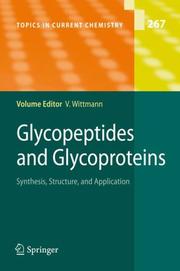| Listing 1 - 3 of 3 |
Sort by
|
Digital
ISBN: 9783540367611 Year: 2007 Publisher: Berlin, Heidelberg Springer-Verlag Berlin Heidelberg
Abstract | Keywords | Export | Availability | Bookmark
 Loading...
Loading...Choose an application
- Reference Manager
- EndNote
- RefWorks (Direct export to RefWorks)

ISSN: 03401022 ISBN: 9783540367604 3540367608 9786610745920 1280745924 3540367616 Year: 2007 Volume: 267 Publisher: Berlin, Heidelberg : Springer,
Abstract | Keywords | Export | Availability | Bookmark
 Loading...
Loading...Choose an application
- Reference Manager
- EndNote
- RefWorks (Direct export to RefWorks)
Glycoproteins --- Glycopeptides --- Glycopeptides. --- Glycoproteins. --- Glycoprotéines --- biosynthesis. --- chemistry. --- Electronic books. -- local. --- Glycoconjugates --- Proteins --- Peptides --- Carbohydrates --- Amino Acids, Peptides, and Proteins --- Chemicals and Drugs --- Biochemistry --- Chemistry --- Physical Sciences & Mathematics --- 547.963.1 --- Glycoproteins. Mucin. Mucoids --- 547.963.1 Glycoproteins. Mucin. Mucoids --- Mucroproteins --- Chemistry. --- Organic chemistry. --- Medicinal chemistry. --- Biochemistry. --- Organic Chemistry. --- Biochemistry, general. --- Medicinal Chemistry. --- Chemistry, Organic. --- Biological chemistry --- Chemical composition of organisms --- Organisms --- Physiological chemistry --- Biology --- Medical sciences --- Organic chemistry --- Composition --- Chemistry, Medical and pharmaceutical --- Chemistry, Pharmaceutical --- Drug chemistry --- Drugs --- Medical chemistry --- Medicinal chemistry --- Pharmacochemistry
Book
ISBN: 9783540367611 Year: 2007 Publisher: Berlin, Heidelberg Springer-Verlag Berlin Heidelberg
Abstract | Keywords | Export | Availability | Bookmark
 Loading...
Loading...Choose an application
- Reference Manager
- EndNote
- RefWorks (Direct export to RefWorks)
In the last 50 years molecular biology was dominated by the exploration of proteins and nucleic acids. Beside their role in energy metabolism, oligos- charides,which represent thethirdclass ofbiomacromolecules, have received less attention. Today it is well established that oligosaccharides are involved in many important biologicalregulation and recognition processes fromp- tein folding to cell-cell communication. Glycosylation of proteins is the most complexformofco-andposttranslationalmodi?cation. Thedeterminationof structure-function relationships, however, remains dif?cult due to the mic- heterogeneity of glycoproteins that exist in many different glycoforms. Thus chemical synthesis of glycoproteins and glycopeptides with de?ned glycan structures plays a pivotal role for the detailed determination of the role of protein glycosylation. This topic is covered by the ?rst two chapters of this bookdealingwiththechemicaland enzymatic synthesis ofglycopeptides and glycoproteins. The third chapter describes the construction of glycopeptide andglycoproteinmimetics containingnon-naturalstructuralelements. These so-calledneoglycopeptidesandneoglycoproteins,respectively,canprovide- sight on the importance of distinct structural elements on biological activity andmayhaveimproved propertiessuchasanincreased stability. Theappli- tion of synthetic glycopeptides, in many cases at the clinical level, as vaccines forbothcancerandHIVisthesubjectofthefourthchapter. Glycopeptide antibiotics are glycosylated secondary metabolites of bacteria and fungi that are synthesized by non-ribosomal peptide synthetases. Some of them serve as antibiotics of last resort in the treatment of nosocomial infections with enterococci and methicillin-resistant Staphylococcus aureus (MRSA) strains. Their structure, biosynthesis, and mode of action are summarized in the ?fth chapter. The last chapter covers current methods for the determination of high-resolution structures of glycopeptides and glycoproteins mainly based onNMRspectroscopy, X-raycrystallography,and molecular modeling.
| Listing 1 - 3 of 3 |
Sort by
|

 Search
Search Feedback
Feedback About UniCat
About UniCat  Help
Help News
News